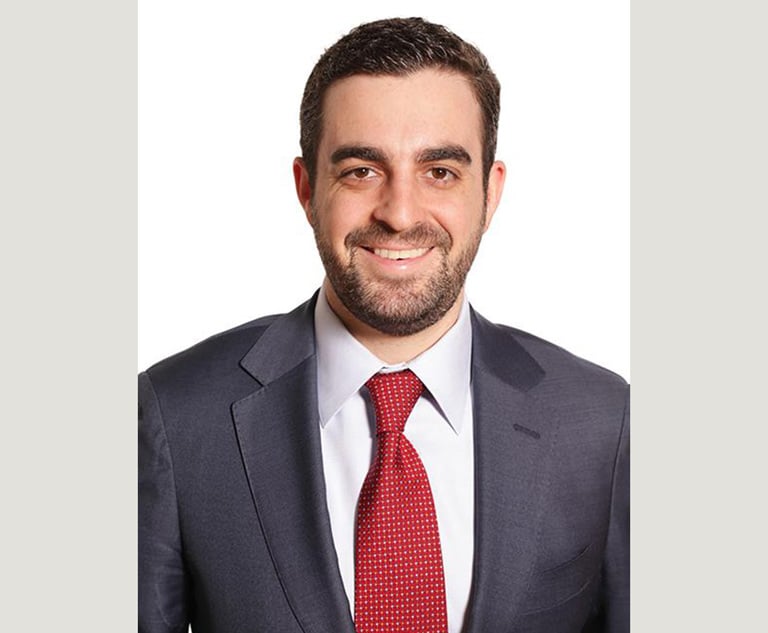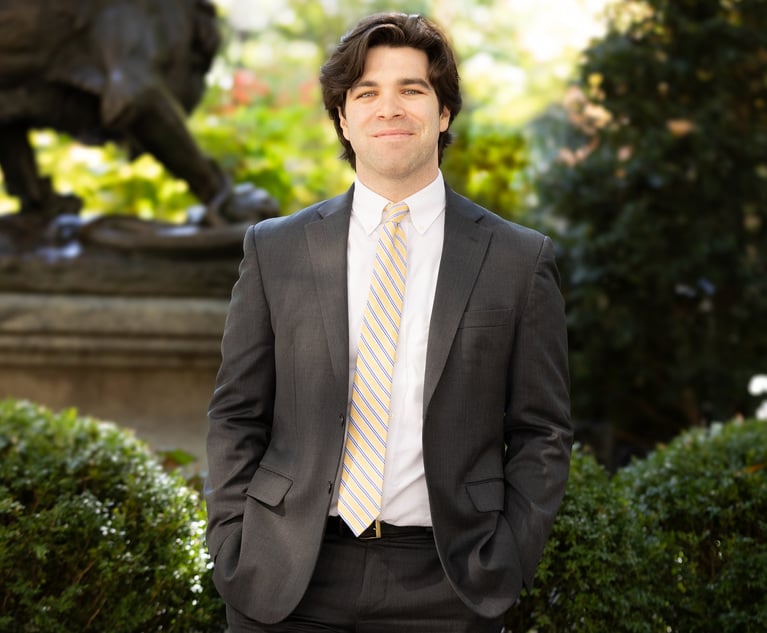Ex-Big Law Partners Face Federal Court Fight Over Marijuana Startup
A pot dispensary launched by a pair of former Polsinelli partners has found itself in federal court over its Philadelphia location.
October 20, 2017 at 10:59 AM
3 minute read
 Medical marijuana.
Medical marijuana.
A medical marijuana dispensary started by two former Big Law partners has hit a bump in its pursuit of a Pennsylvania facility, and the ability to open it may rely on federal courts.
PharmaCann, which was founded by former Polsinelli partners Teddy Scott and John Leja, has found itself caught up in litigation over opening its business in a Philadelphia shopping complex. Scott is still the CEO of PharmaCann, and former Polsinelli lawyer Jeremy Unruh is its general counsel.
The case is one of several involving Pennsylvania's medical marijuana program or its participants, threatening to slow the state's ambitious timeline for implementation of a medical cannabis program.
After receiving licenses to operate cannabis dispensaries in Illinois and New York, PharmaCann pursued and won a license to operate a Pennsylvania facility in Philadelphia, at a former Chi-Chi's restaurant. But the shopping complex owner that sold the property to Chi-Chi's in 1991 has said it's illegal to open a marijuana dispensary there.
Pennsylvania licensees are required to be fully operational by January of next year, so PharmaCann sought an order from Pennsylvania courts to push the sale through.
PharmaCann filed suit last month in the Philadelphia Court of Common Pleas against the developers and property owners involved in the Philadelphia Mills shopping complex, including Franklin Mills and Simon Property Group, seeking declaratory relief. Franklin Mills and Simon have now sought to remove the case to federal court.
Pennsylvania lawmakers have passed legislation allowing medical marijuana in the state, under strict regulations. But marijuana is not legal under federal law, even for medical purposes.
According to PharmaCann's complaint, when Franklin Mills sold the property to Chi-Chi's in 1991, it was subject to certain deed restrictions. When PharmaCann sought to take over the space, Franklin Mills got the right of first refusal to repurchase but waived that right in a March 2017 letter, the complaint said. Still, in the same letter, Franklin Mills said the sale of the property for use as a medical marijuana dispensary is prohibited under the 1991 deed.
But PharmaCann argued that, because Pennsylvania has enacted legislation authorizing medical marijuana sale and use, the deed would no longer prohibit that use of the property.
In their notice of removal, Franklin Mills and Simon argued that the defendants are from a diversity of jurisdictions, and that the amount in controversy exceeds $75,000, as the property sold for $560,000 in 1991.
The dispute is far from the only one to arise from Pennsylvania's medical cannabis program.
As PharmaCann fights for its Philadelphia location, the entire medical marijuana program is being challenged in other litigation brought by companies who applied for licenses and did not win them. Organizations including the Pennsylvania Cannabis Coalition, the Campaign for Compassion and Patient-First Association of Companies have looked to intervene in those cases.
Joshua Horn of Fox Rothschild, who represents PharmaCann, said, “We feel very strongly about our case and don't believe it should be in federal court.” Unruh, the company's GC, did not immediately respond to a call for comment.
Blank Rome is representing Franklin Mills and Simon. The firm did not respond to a request for comment.
This content has been archived. It is available through our partners, LexisNexis® and Bloomberg Law.
To view this content, please continue to their sites.
Not a Lexis Subscriber?
Subscribe Now
Not a Bloomberg Law Subscriber?
Subscribe Now
NOT FOR REPRINT
© 2024 ALM Global, LLC, All Rights Reserved. Request academic re-use from www.copyright.com. All other uses, submit a request to [email protected]. For more information visit Asset & Logo Licensing.
You Might Like
View All
Philadelphia Bar Association Executive Director Announces Retirement
3 minute read
Phila. Jury Hits Sig Sauer With $11M Verdict Over Alleged Gun Defect
3 minute read
Phila. Attorney Hit With 5-Year Suspension for Mismanaging Firm and Mishandling Cases
4 minute read
Trending Stories
- 1Gibson Dunn Sued By Crypto Client After Lateral Hire Causes Conflict of Interest
- 2Trump's Solicitor General Expected to 'Flip' Prelogar's Positions at Supreme Court
- 3Pharmacy Lawyers See Promise in NY Regulator's Curbs on PBM Industry
- 4Outgoing USPTO Director Kathi Vidal: ‘We All Want the Country to Be in a Better Place’
- 5Supreme Court Will Review Constitutionality Of FCC's Universal Service Fund
Who Got The Work
Michael G. Bongiorno, Andrew Scott Dulberg and Elizabeth E. Driscoll from Wilmer Cutler Pickering Hale and Dorr have stepped in to represent Symbotic Inc., an A.I.-enabled technology platform that focuses on increasing supply chain efficiency, and other defendants in a pending shareholder derivative lawsuit. The case, filed Oct. 2 in Massachusetts District Court by the Brown Law Firm on behalf of Stephen Austen, accuses certain officers and directors of misleading investors in regard to Symbotic's potential for margin growth by failing to disclose that the company was not equipped to timely deploy its systems or manage expenses through project delays. The case, assigned to U.S. District Judge Nathaniel M. Gorton, is 1:24-cv-12522, Austen v. Cohen et al.
Who Got The Work
Edmund Polubinski and Marie Killmond of Davis Polk & Wardwell have entered appearances for data platform software development company MongoDB and other defendants in a pending shareholder derivative lawsuit. The action, filed Oct. 7 in New York Southern District Court by the Brown Law Firm, accuses the company's directors and/or officers of falsely expressing confidence in the company’s restructuring of its sales incentive plan and downplaying the severity of decreases in its upfront commitments. The case is 1:24-cv-07594, Roy v. Ittycheria et al.
Who Got The Work
Amy O. Bruchs and Kurt F. Ellison of Michael Best & Friedrich have entered appearances for Epic Systems Corp. in a pending employment discrimination lawsuit. The suit was filed Sept. 7 in Wisconsin Western District Court by Levine Eisberner LLC and Siri & Glimstad on behalf of a project manager who claims that he was wrongfully terminated after applying for a religious exemption to the defendant's COVID-19 vaccine mandate. The case, assigned to U.S. Magistrate Judge Anita Marie Boor, is 3:24-cv-00630, Secker, Nathan v. Epic Systems Corporation.
Who Got The Work
David X. Sullivan, Thomas J. Finn and Gregory A. Hall from McCarter & English have entered appearances for Sunrun Installation Services in a pending civil rights lawsuit. The complaint was filed Sept. 4 in Connecticut District Court by attorney Robert M. Berke on behalf of former employee George Edward Steins, who was arrested and charged with employing an unregistered home improvement salesperson. The complaint alleges that had Sunrun informed the Connecticut Department of Consumer Protection that the plaintiff's employment had ended in 2017 and that he no longer held Sunrun's home improvement contractor license, he would not have been hit with charges, which were dismissed in May 2024. The case, assigned to U.S. District Judge Jeffrey A. Meyer, is 3:24-cv-01423, Steins v. Sunrun, Inc. et al.
Who Got The Work
Greenberg Traurig shareholder Joshua L. Raskin has entered an appearance for boohoo.com UK Ltd. in a pending patent infringement lawsuit. The suit, filed Sept. 3 in Texas Eastern District Court by Rozier Hardt McDonough on behalf of Alto Dynamics, asserts five patents related to an online shopping platform. The case, assigned to U.S. District Judge Rodney Gilstrap, is 2:24-cv-00719, Alto Dynamics, LLC v. boohoo.com UK Limited.
Featured Firms
Law Offices of Gary Martin Hays & Associates, P.C.
(470) 294-1674
Law Offices of Mark E. Salomone
(857) 444-6468
Smith & Hassler
(713) 739-1250





